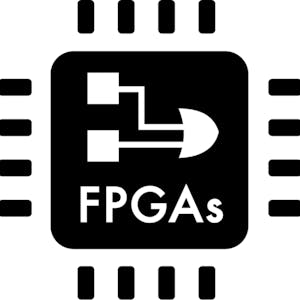The "FPGA Design for Embedded Systems" course offers a deep dive into the world of Field Programmable Gate Arrays (FPGAs) and Complex Programmable Logic Devices (CPLDs). With a focus on practical application, learners will gain proficiency in creating FPGA prototypes and products for diverse applications. The course encompasses an array of topics, including Verilog, VHDL, and RTL design for FPGA and CPLD architectures, FPGA development tools flow, configurable embedded processors, use of soft-core and hard-core processors, FPGA system engineering, IP development, and more. Through hands-on projects, participants will develop a broad perspective of various Programmable SoC solutions and ultimately build FPGA systems based on low-cost evaluation boards.
By the end of the course, learners will have acquired skills in creating FPGA working systems on a chip design, understanding and practicing all aspects of FPGA development, and applying hierarchical design methods to create larger designs in VHDL or Verilog. The course culminates in a capstone project where participants will implement the concepts covered by building FPGA systems based on low-cost evaluation boards.
Certificate Available ✔
Get Started / More Info
This course covers a comprehensive introduction to FPGA design, hardware description languages, FPGA softcore processors, IP acquisition, and a capstone project focused on building FPGA projects.
Introduction to FPGA Design for Embedded Systems: This module provides a foundational understanding of FPGA technology, including its development, selection criteria for different applications, and the use of state-of-the-art software tools for FPGA development and problem-solving.
Hardware Description Languages for FPGA Design: Learners will explore the role of HDLs in design entry and verification for FPGAs and ASICs, as well as utilize HDL software tools for FPGA development.
FPGA Softcore Processors and IP Acquisition: This module focuses on creating a Nios II softcore processor hardware design, understanding the benefits and steps of implementing custom instructions, exploring available types of IP for FPGAs, and using simulation with ModelSim to verify FPGA designs.
FPGA Capstone: Building FPGA Projects: Participants will create a working FPGA design using Quartus Prime, run it on an evaluation board, and gain practical experience in conception, design, implementation, and debugging of FPGA systems.
Batteries and Electric Vehicles: Gain insights into battery performance in zero emission vehicles, EV charger networks, and regulatory requirements in this comprehensive...
Ferrous Technology II delves into the complexities of steel, exploring fundamental and technical aspects such as iron and steelmaking, microstructure, phase transformation,...
This course delves into the analysis and design of magnetic components for power electronic converters, equipping learners with the skills to understand, model,...
This course offers a comprehensive exploration of transmission line design, modeling, and performance assessment, equipping participants with theoretical knowledge...